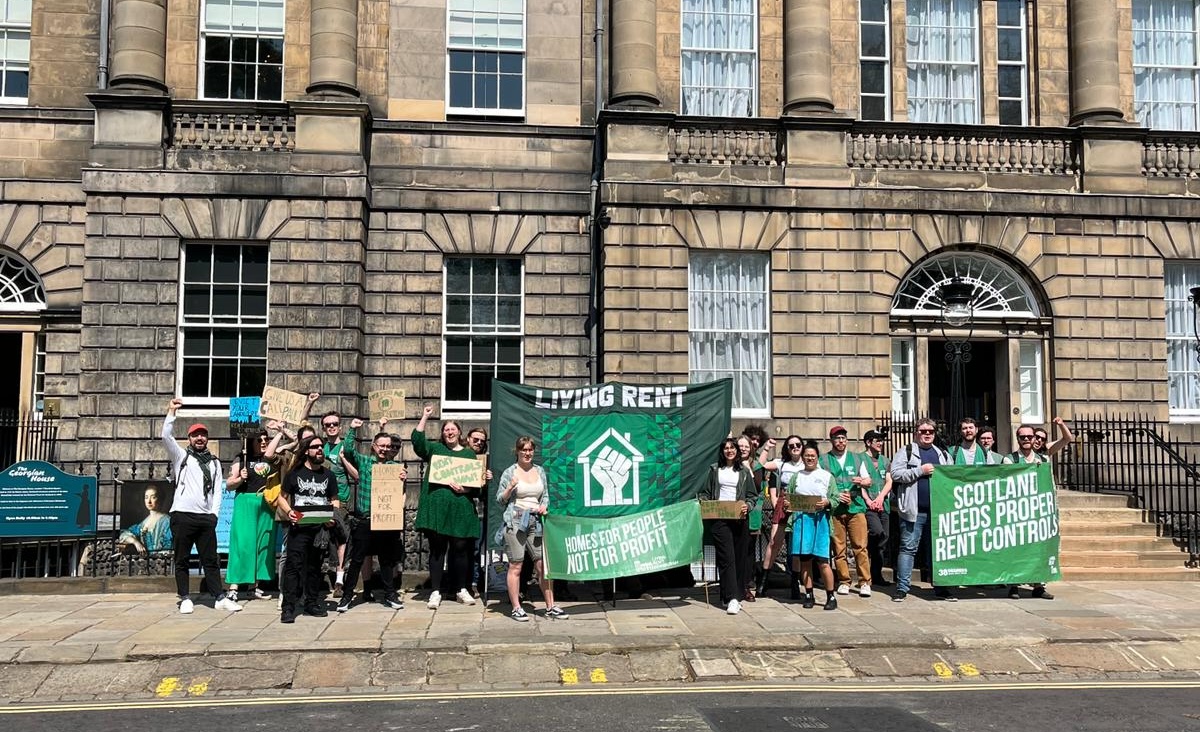Tenants stage Bute House rally in support of rent controls

Tenants from Living Rent staged a rally in support of rent controls outside Bute House to call on the First Minister to continue supporting rent controls.
The rally in Edinburgh, held alongside rallies in Glasgow and Aberdeen, coincided with the Scottish Parliament’s consultation on the Housing Bill in which it is calling for evidence from stakeholders. The rally in Glasgow was held next to the statue of Mary Barbour, a key in the fight for rent controls when they were first introduced in Scotland in 1915.
Living Rent is calling on new First Minister John Swinney to continue pushing for effective and thorough rent controls as part of ensuring the bill delivers the housing required for Scotland.
Last week, the Scottish Government joined five local authorities in declaring housing emergencies declared a housing emergency across Scotland due to a shortage of social housing.
In declaring a housing emergency, Living Rent said the government recognises the pressures facing residents, the overall increase in homelessness applications, and a lack of adequate resources to process them. In 2024, the Scottish Homelessness Monitor suggests that homelessness could rise by a third (33%).
The tenants’ union said tenants have been “pushed to the edge by the end of the rent cap”. It argued that the Scottish Government needs to reaffirm its commitment to a strong robust system of rent controls that have the capability to bring rents down.
In the last ten years, Scotland has experienced extortionate rent increases. Data from the Scottish Government published in November revealed that between 2010 and 2023, rents across Scotland have increased on average by 51.6%. In some local authorities, increases are even sharper. In Lothian rent increased by 79.3%, and in Greater Glasgow rent increased by 86.2%. By contrast, inflation was 45.7% during the same period.
During the cost of living crisis tenants have faced even sharper increases. In the last year, rents across Scotland have increased by 14.3% to an average of £841 per month. In Greater Glasgow, rents rose by 22.3% to an average of £1050 per month, in Lothian, rents rose by 18.4% to an average £1192. This is among the highest year-on-year growth in the UK.
The impact that high rents are having on people’s ability to afford to live was also highlighted by Living Rent. Low earners pay over half of their monthly wages on rent with most other wage brackets paying approximately a third.
As a result, a third (29%) of people are struggling with their present incomes and an estimated one in ten (11%) of households in poverty were experiencing ‘very low’ food security – meaning that meals were skipped, or food intake reduced because the family could not afford enough food.
Living Rent’s national campaigns officer, Ruth Gilbert, said: “Tenants have been pushed to the edge by the end of the rent cap and eviction ban. The rent cap provided a temporary bandage over a growing crisis, but it has not addressed the fundamental issue that rents are out of control.
“Rents in Scotland have continued to rise in line with the rest of the UK because the temporary measures did not go far enough, and did not apply between tenancies.
“Tenants desperately need this government to introduce a robust system of rent controls tied to the property, not the tenancy, which protects all tenants. The new Housing Bill is a key opportunity for proper rent controls and our presence today demonstrates the importance of it.
“The Scottish Government urgently needs to reverse its cuts to affordable housing, and commit to strong, permanent rent controls. Without this, tenants will continue to be forced to put up with unaffordable housing.”







